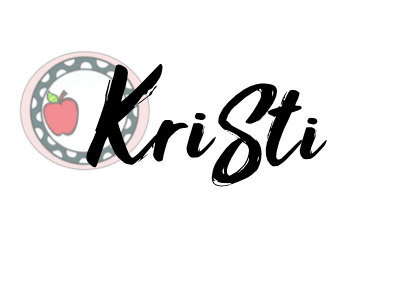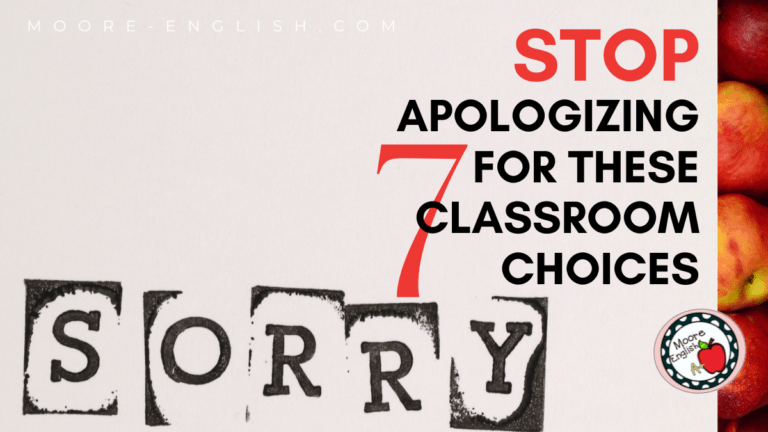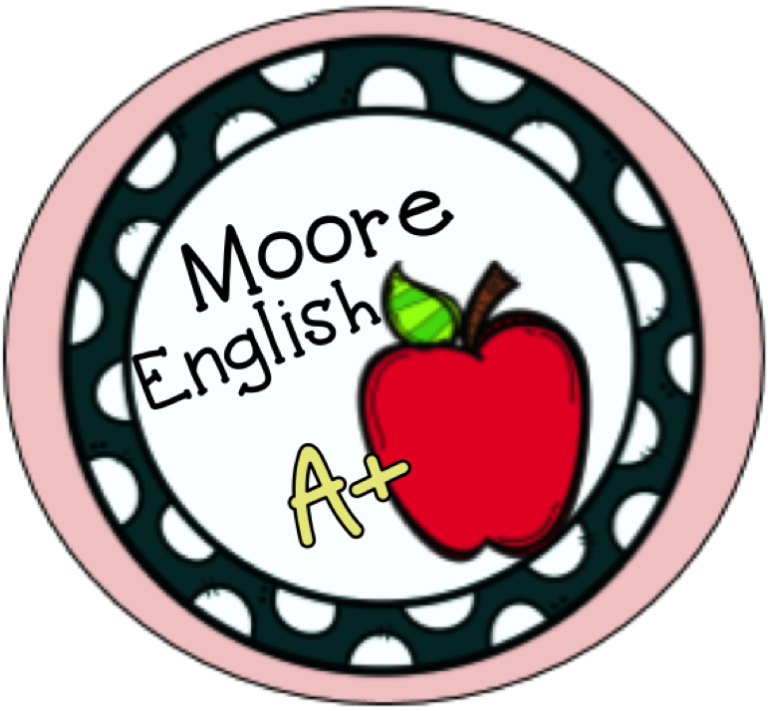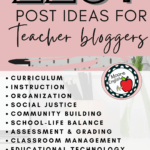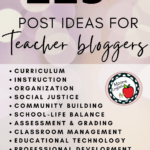From time to time, writer’s block visits all teacher bloggers. While writing this blog each week, I sometimes need a little extra inspiration.
Thankfully, Pinterest is full of lots of post ideas, content calendars, and title templates. However, most of those prompts are for lifestyle bloggers, health and family bloggers, and people who blog…about blogging.
All of those content types are interesting and meaningful, but I’m kind of tired of reading lists of blog post prompts that claim to be “for all niches!” when, really, teacher bloggers are left out.
With all of this in mind, today I want to share post ideas for busy teacher bloggers. If I leave out a topic you’d find interesting, drop me a suggestion in the comments!
This post this post may contain affiliate links. Please read the Terms of Use.
Curriculum Posts for Teacher Bloggers
Firstly, writing and designing curriculum may be my greatest professional love! Structuring a unit, scaffolding instruction, and thinking like a designer are all invigorating for me!
- What are the elements of a failed curriculum?
- How do you lead the curriculum writing process?
- How do you develop a curriculum from start to finish?
- What are the signs that it’s time to revise curriculum?
- What details DO NOT need to be included in curriculum?
- Which structure or framework do you use for writing curriculum?
- What are the elements of successful and meaningful curriculum?
- How can teachers implement a curriculum with which they disagree?
- What kind of professional development should accompany curriculum writing?
- How can administrators and instructional coaches support teachers writing curriculum?
Instructional Strategies
While writing curriculum might be one of my favorite tasks, writing about instructional strategies is my favorite part of being a teacher blogger. Similarly, when I am reading teacher blogs, I’m probably looking for new, fresh instructional strategies. Also, I’m sometimes looking for instructional strategies that will help me reach a struggling learner.
- What is your favorite instructional strategy?
- How does instruction support assessment?
- How does collaboration support instruction?
- What manipulatives do you use to support instruction?
- What role do voice and choice play in your instruction?
- Which kind of anticipatory sets do you find successful?
- How do you balance small and whole group instruction?
- When and how do you adapt instruction to student needs?
- How did distance learning change your instructional strategies?
- How much control do you have over your curriculum and pacing?
- What instructional strategies are particularly challenging for you?
- How do you incorporate meaningful movement in your instruction?
- Which instructional strategies have you left behind or discontinued?
- How do you incorporate visualizing and visualization into instruction?
- What are your favorite strategies for promoting classroom discussion?
- What instructional strategies do you use for intervention and enrichment?
- How do you decide which instructional strategies to use in a specific lesson?
- How do you gather feedback about the efficacy of your instructional strategies?
- What resources or which individuals inspire you to try new instructional strategies?
- When and how do you incorporate meaningful project-based and cooperative learning?
Assessment Thoughts from Teacher Bloggers
No teacher gets into education because you love testing, which makes this such an important topic for teacher bloggers. Every spring, there’s an incredible push and emphasis on standardized testing, so assessment is a very real part of education. For this reason, I love to read about how other teacher bloggers make the most of testing that is not ideal.
- When and how do you use exit slips?
- How do you approach summative assessment?
- How do you incorporate formative assessment?
- What does a quality formative assessment look like?
- How do you mitigate the dangers of high-stakes testing?
- How do you incorporate voice and choice in assessment?
- What is your process for assessment re-takes or revision?
- When and how do you evaluate formative assessment data?
- Can assessment become an opportunity rather than a chore?
- What is the role of projects and presentations in assessment?
- What are the features of a high-quality summative assessment?
- How does formative assessment support summative assessment?
- How do you encourage students to buy in to formative assessment?
- What is your process of designing meaningful summative assessments?
- What are your favorite assessment alternatives to traditional tests and exams?
- When and how do you prepare students for high-stakes, standardized testing?
- How do you prevent content and racial bias from affecting the assessment process?
- When students do not meet your expectations on an assessment, how do you respond?
- How do you help students approach summative assessments with a sense of confidence?
- How do you incorporate metacognition, reflection, and goal setting in the assessment process?
- As colleges and universities turn away from the ACT and SAT, how will that affect K-12 education?
- Under what circumstances would you allow or not allow a student to revise or re-take an assessment?
Grading
Like assessment, few teachers get into this business because we love red pens. However, feedback is an important part of teaching and learning. Of course, I’m constantly looking for opportunities to improve my practice in this area.
- When do you have to set grading aside in favor of mental health and finding balance?
- How do you balance the need for efficiency with the need to provide feedback?
- When you’re not excited to grade, how do you find motivation to get started?
- What are your tips for communicating grades to students and families?
- When cheating or academic dishonesty occurs, how do you respond?
- How do you incorporate student conferences into grading?
- How do you discuss grades with students and families?
- What tools help you to make the most of grading time?
- What strategies help you manage your grading load?
- Where do you grade most efficiently and effectively?
- When and why might you consider delaying a grade?
- What is the best environment for grading?
- How do you use rubrics effectively?
- How do you make time to grade?
- When do you curve grades?
Social Justice Perspective from Teacher Bloggers
Overwhelmingly, social justice is the area where there is the greatest opportunity for teacher bloggers. Similarly, this is also the place where some of the most challenging and necessary content lives. Although the topics in this area may be uncomfortable for some, this is an essential area for teacher bloggers and for anyone associated with education.
- How you discuss privilege in your classroom?
- How does social justice inform your instruction?
- What is your approach to sensitive topics in the classroom?
- How do you choose diverse texts for your classroom library?
- Do you celebrate Banned Books Week or read banned books?
- How does your school or district approach equity and inclusion?
- How do you incorporate social justice into your assessment design?
- What kind of equity professional development does your district provide?
- How is your district responding to the racial reckoning happening right now?
- What would a diversity audit of your classroom library or required readings reveal?
- What opportunities exist to make sure that all students and families feel welcomed?
- How do you handle a student or family’s challenge of a book or instructional choice?
- How much freedom do you have to discuss sensitive or difficult topics in your classroom?
- What aspects of social justice pedagogy are you still learning about or want to learn about?
- How do you communicate that anti-bias and anti-racism is an important part of your instruction?
School-Life Balance
As I write this, school-life balance has been on my mind a lot lately. As we all know, teaching during the pandemic is a special kind of stressful and exhausting. Therefore, I’m particularly interested in how we use the experience of teaching in a pandemic to improve teacher-life balance going forward.
- How do you balance the demands of teaching with the demands of being a parent or spouse?
- How has the pandemic and distance learning affected your health and approach to teaching?
- What kinds of resources does your school or district provide to support your mental health?
- How could schools improve in regards to supporting the mental health of teachers?
- Have you ever taken a personal or professional day off to accomplish school tasks?
- Do you take your personal and professional days to support your mental health?
- What kinds of strategies do you use to maintain your own health and wellness?
- What suggestions do you have for someone experiencing a sense of burnout?
- Which time management strategies help you maintain a school-life balance?
- Does the use of a specific planner help you manage everything?
- Does meditation, yoga, or exercise help you prevent burnout?
- How do you recover when you do feel burned out?
- What strategies do you employ to avoid burnout?
- How do you practice sustainable teaching?
- How do you practice self-care?
Professional Development
As all teachers know, there’s plenty of talking heads in education telling teachers how to teach. However, few of those so-called experts have the real-world experience to appreciate the kinds of professional development relevant in today’s classroom. For this reason, it’s essential that teacher bloggers use their platforms to provide commentary on the kinds of PD that work.
- Why did you become a teacher?
- Who influences or inspires you professionally?
- Who or what inspired you to become a teacher?
- How did you know teaching was the career for you?
- What professional conferences do you recommend?
- What professional organizations do you recommend?
- Have you ever led a professional development session?
- What are the characteristics of an effective teacher mentor?
- What are the characteristics of poor professional development?
- How would you describe the future of professional development?
- Which kind(s) of professional development would you like to lead?
- How can instructional coaches support professional development?
- What kind of professional development focus would you like to see?
- Which professional development books are particularly inspirational?
- What podcasts or TED talks are a source of professional development?
- What are the best structures for meaningful professional development?
- How would you describe your dream professional development session?
- What are the characteristics of a successful professional development leader?
- What is a new or recent professional development release you’re excited about?
- What is a professional development program or text you would recommend for new teachers?
Classroom Community
Of the topics on this list, this one is probably the hardest to quantify. Classroom culture and community is nebulous, but you know when a classroom is a community and when a classroom lacks community. As a result, teacher bloggers can share their unique perspectives on this important topic!
- What professional development texts help you to understand and develop classroom community?
- What tips would you give to a new teacher trying to build classroom community for the first time?
- Which factors are in your control and which are out of your control when building community?
- What are the characteristics of struggling or underdeveloped classroom community?
- At the beginning of the year, how do you begin the process of building community?
- How does classroom community support student success and achievement?
- How do classroom expectations and norms support classroom community?
- When and how do you handle disruptions of classroom community?
- What are the features of well-developed classroom community?
- What strategies are essential to building classroom community?
- How does dialogue support developing classroom community?
- How does building culture affect classroom community?
- In what way could your classroom community improve?
- How do students contribute to classroom community?
- What practices undermine classroom community?
Classroom Organization
I love organization projects! One of my favorite parts of back to school is looking at all the different organizational suggestions and ideas! If you’re new to blogging, classroom organization is a great place to begin because you can use what you already know and have.
- What is an organizational system you have tried that didn’t work for you?
- What are classroom organizational must-haves and what are luxuries?
- How does classroom organization support classroom management?
- Which aspects of classroom organization are the most challenging?
- What role do students play in supporting classroom organization?
- How does classroom organization support student self-efficacy?
- What classroom procedures support classroom organization?
- How does classroom organization support substitutes?
- What classroom supplies help you stay organized?
- Which tools help with classroom organization?
- What does an organized classroom look like?
How do you…
- organize digital spaces like Google Classroom?
- keep classroom organization manageable?
- manage classroom papers and copies?
- organize lesson plans and curriculum?
- organize student assessment data?
- manage absent and late work?
- organize classroom supplies?
- declutter your classroom?
- organize sub materials?
Educational Technology from Teacher Bloggers
Overall, posts about educational technology are super popular because there’s so many types of educational technology and the field is always changing. For new teacher bloggers, this is a great place to begin because there’s so much to discuss!
What is your…
- favorite classroom software?
- favorite classroom hardware?
- opinion of Google Certification?
- experience with blended learning?
- experience with flipping the classroom?
- preferred learning management system?
- What was your distance learning experience like?
- What kind of educational technology do you prefer?
- When do you find time to explore new technologies?
- How do you use educational technology for test prep?
- Are you a reluctant or early adopter of new technologies?
- How do you use educational technology for gamification?
- What are your Holy Grail pieces of educational technology?
- What social media do you use for professional development?
- How do you help students make good choices with technology?
- What educational technology do you use to analyze student data?
- What educational technology does and does not excite and inspire you?
- When and how do you use Google Drive and Google Apps for Education?
- What kind of professional development do you need about educational technology?
- How do you use educational technology to support differentiation and intervention?
- How do you incorporate digital citizenship and digital media literacy in your instruction?
Classroom Management
Like classroom community, classroom management is hard to quantify. When teacher step into a well managed classroom, they know. Similarly, when you find a classroom with weak management, you know then too. As with so many things, classroom management is not well understood, so there’s lots of opportunities here.
- How can you make classroom transitions effective?
- What does effective classroom management look like?
- How does mindfulness play a part in classroom management?
- What are the characteristics of weak classroom management?
- How does restorative justice relate to classroom management?
- How does relationship building support classroom management?
- What are creative solutions to classroom management struggles?
- How can you make sure your classroom management is proactive?
- What do you do when you’re struggling with classroom management?
- What are classroom management strategies teachers should stop using?
- How does classroom management relate to and support student discipline?
- How can an instructional coach help teachers with classroom management?
- What makes entrance and exit procedures a part of classroom management?
- How do you reflect on the success of your classroom management strategies?
- What advice would you give to someone who struggles with classroom management?
Building Climate and Leadership
For many teachers, issues of building climate and leadership seem out of reach. However, teachers do have input and a part in developing a building’s atmosphere.
- How does a strong building leader behave?
- How can new teachers impact building culture?
- What are the features of a successful staff meeting?
- Why is it important for teachers to support building culture?
- What are the characteristics of effective building leadership?
- Which one is more important–building or district leadership?
- How can building initiatives impact building climate and culture?
- How do department chairs and lead teachers affect building culture?
- What is the role of building leadership in developing building culture?
- How should teachers respond to building initiatives they do not support?
- What role do teachers play in developing building culture and community?
- Why is it beneficial to invite parents, families, and community into education?
- What small actions from building leaders can inadvertently create stress for teachers?
- How can building leadership invite parents, families, and the community into education?
- What small steps can building administrators take to relieve pressure placed on teachers?
Teacher Blogger
Overall, this is the area that inspired me to put together this list of topics. When I was looking for some inspiration, I couldn’t find anything specific to teacher bloggers, so I started building this list of topics.
- How did you become a teacher blogger?
- What are your goals as a teacher blogger?
- How do you monetize being a teacher blogger?
- What are keys to success as a teacher blogger?
- Which other teacher bloggers do you admire and follow?
- What are your favorite parts of being a teacher blogger?
- How do you use social media to support your teacher blog?
- What tips or suggestions would you give to new teacher bloggers?
- What are some of the worst mistakes you made as a teacher blogger?
- Which digital tools are essential to your success as a teacher blogger?
- How do you balance being a teacher blogger with classroom responsibilities?
- Which content strategies help you stay inspired and creative as a teacher blogger?
- What are some of the most important lessons you have learned as a teacher blogger?
- What courses, e-books, podcasts, or other resources do you recommend for a new teacher blogger?
- Of the new skills you have learned since becoming a teacher blogger, which have proven most useful?
TPT and Teacherpreneurs
Finally, as with topics related to teacher bloggers, there are some parts of being a TPT seller or teacherpreneur that aren’t discussed enough. Additionally, a lot of the posts I find about TPT are geared toward elementary teachers and/or seem really out of date.
- How did you get started with TPT?
- Which TPT sellers do you most admire?
- How do you respond to criticisms of TPT?
- What are your greatest successes with TPT?
- What kinds of resources do you most enjoy making?
- How has TPT success helped you support your family?
- How does being a teacher blogger support your TPT store?
- What are the greatests lessons you have learned from doing TPT?
- Which social media platforms do you use to support your TPT store?
- What fears or concerns almost stopped you from starting a TPT store?
- How do you balance doing TPT with classroom and family responsibilities?
- What are some things you wish you had known when you started doing TPT?
- Have you considered selling teacher resources on any other platforms other than TPT?
- What courses, e-books, podcasts, or other resources do you recommend for someone new to TPT?
- How do you respond when someone suggests teachers should freely give each other resources rather than selling them?
Write On Teacher Bloggers
Overall, I hope these topics help you beat writer’s block. In the comments, let me know which topics you’d like to see me address here on Moore English. If there are subjects you’d like to learn about that aren’t listed here, let me know that, too!
